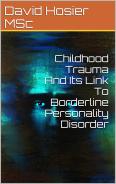Tags
What Kinds of Problems does Childhood Trauma Cause? Part 1.
One thing from research is clear: the experience of childhood trauma makes it more likely the individual will suffer problems as an adult. Abuse does not, though, necessarily lead to severe problems, but makes a person more VULNERABLE to them in later life.
THE MORE SEVERE AND REPEATED THE ABUSE THE MORE LIKELY THE INDIVIDUAL WILL DEVELOP PROBLEMS LATER.
However, if the child also has good experiences in childhood this can serve to build up RESILIENCE, diminishing the negative effects of abuse.
For resilience to develop, it is particularly important that the child does not blame him or herself for the abuse.
COMMON PROBLEMS RESULTING FROM ABUSE IN CHILDHOOD:
guilt and shamedepression, hopelessness, helplessness
alcohol and drug misuse
eating disorders
self-harm eg. cutting self, attempting suicide
lack of confidencesocial withdrawal
poor anger management
difficulty trusting others
being drawn into further abusive relationships
NEGATIVE BELIEF SYSTEM.
Survivors of childhood abuse are much more likely to hold an array of negative beliefs. Their view of themselves and their general outlook tend to be negative. British Psychologist Professor Jehu summarized the kinds of negative beliefs held:
BELIEFS ABOUT SELF:
I am unusual
I am bad
I am worthless
I am to blame
BELIEFS ABOUT OTHERS:
Others are untrustworthy
Others will reject me
BELIEFS ABOUT THE FUTURE:
The future is hopeless
THE EFFECTS OF ABUSE ON THINKING PROCESSES:
Research on this has led to two main findings:
1) Those who have been abused tend to DETACH (or ‘space out’) more than the average person. This is known as DISSOCIATION. It can involve cutting off from emotions or feeling ‘unreal’. Sometimes, if the original trauma was especially adverse and distressing, it might be REPRESSED (‘blanked out’ from memory).
Survivors are sometimes driven by their pain to INTENTIONALLY dissociate by:
drinking alcohol
smoking
using drugs
binge eating
self-injuring /gambling
2) Survivors of abuse are much more sensitive to abuse-related triggers. This is a kind of defense mechanism: by being hyper-alert to possible danger, the person is more able to protect him or herself. However, if as an adult there is much lower risk, this oversensitivity can severely interfere with the person’s quality of life.
Best wishes, David Hosier BSc Hons; MSc; PGDE(FAHE).




